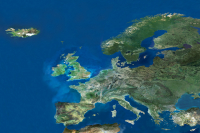2012, a turning point for Europe in space Actuelles de l'Ifri, The Europe & Space Series, No. 9, February 2012
In 2012, several crucial decisions lie ahead, most notably at the ESA Ministerial Council next fall and regarding the status of space within the next MFF of the EU. These will reveal the degree of political will to pursue an ambitious ESP in times of economic and financial constraint.

2012 is likely to be a serious test year for the European Space Policy (ESP), with several crucial decisions ahead, most notably at the ESA Council at Ministerial level next fall and regarding the status of space within the next Multiannual Financial Framework (MFF) of the EU (European Union). These decisions will have mid- to long-term consequences, and will also reveal the degree of political will to pursue an ambitious ESP in times of economic and financial constraint.
2011 has been a prolific and successful year for the ESP. The past months were marked by high-profile successes: the second flawless docking of the Automated Transfer Vehicle (ATV) to the International Space Station (ISS), the first flight of the Europeanised Soyuz launcher carrying the first two operational Galileo satellites, the important discoveries and observations made by the Herschel, Cryosat, Proba-2 and Mars Express missions, the approval of the Meteosat Third Generation (MTG) programme, one of the most complex space projects ever initiated by Europe, or the launch of the first French high resolution and dual-use Earth observation (EO) satellite Pléiades. At the same time, governance and funding issues continued to burden the ESP – epitomised in the harsh conflict over the future of the Global Monitoring for Environment and Security (GMES) programme. Similarly, issues as important as the future launcher policy, the ISS policy or the exploration strategy are still marked by uncertainty.
This paradoxical situation is very much representative of Europe’s efforts in space. Despite the absence of a state-centric and unitary political dynamic, Europe is a leading space power at the global level. However, this balance between scientific and technological successes and cumbersome political bargaining is fragile. Two years after the adoption of the Lisbon Treaty, which gave both new competences and new responsibilities to the EU in space, the question remains the same: will Europe remain a major spacefaring actor, or is it going to decline in a context of economic crisis, increasing global competition and persisting internal deadlocks?
To understand what is at stake in the upcoming months, it is necessary to analyse the context in which decisions will be taken, focusing in particular on enabling and constraining factors. In this respect, we will first identify the structural trends framing the decision-making process, both at the external and internal level (1). On the basis of these elements, specific focuses will be put on the two flagship programmes (2), on the issues to be discussed at the ESA Council (3) and on space and security (4).


